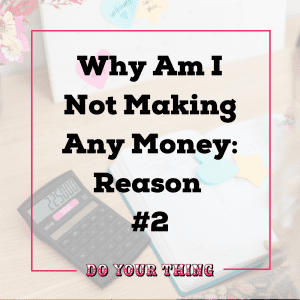Hustle on 11? Open Your Eyes
Last week we kicked off this three-part series — my answers to the most common question I’m asked by prospective clients, “Why am I not making any money?” Oh yes, this is the cry of despair I hear most, the painful situation that brings people to my figurative door.
Last week’s post dug into the very real connection between your pricing and your workload, how prices that are too low lead to a schedule that is too crazy and, most often than not, to a bank balance that doesn’t match your expectations or your needs, despite all that damn Hustle. If you missed that one, it’s right here.
Today we’re gonna turn our attention to Reason #2, which is a situation I see playing out all over the place. Heck, I know I’ve done this myself.
Reason #2 Why Your Hustle is on 11, Bank Balance on 2?
2. Your Spending Is Not (As) Strategic (As It Could Be).
I coulda said here, Your spending is too high, but that’s too simplistic. I really mean that you’re not making the best decisions about your spending, typically because you’re closing your eyes.
Example: Have you ever been presented with a spending opportunity and been unsure about whether it was the right use of your resources, whether it made sense or was really worth it, but then just said, Fuck It and done it anyway? Yeah, you closed your eyes.
You know that saying, what you focus on increases? Conversely:
What you ignore tends to slip more easily, unseen, through your fingers.
Many of us are so uncomfortable about money, have experienced and been marked by scarcity in our lives at some point, that we have a tendency to not want to look at financial things too directly. We think we’re protecting ourselves by just keeping $$$ at arm’s length, avoiding the discomfort and other feelings we have when we deal with it. [Which is why you may be avoiding your business’s Quickbooks, too. #nojudgment
On top of just general avoidance of numbers, there are also some kinds of expenses that seem more prone to eyes-closed-tight “decision”-making. Professional Development, such as on-line courses, trainings, certifications, masterminds, group coaching: these are all zones where in my experience of reviewing small business numbers, it’s super-tempting to short-cut deliberations with a quick Fuck It + credit card number.
[Allow me to interject for the record that I am not opposed to declaring Fuck It in some situations, I am also not opposed to debt as a general rule (it’s not meth, people, and can be used safely and with personal control).]
If some of this sounds/feels familiar, if you think this might be you, driving that car of your small business with your eyes shut, here are some questions you can ask to dig a little deeper, to practice keeping your eyes open.
- Can you identify any past or present Fuck It spending in your biz? If you can, please promise that you won’t beat yourself up about it. Deep breath, then consider if there are specific areas in your business that flip your eyes shut, areas where you could use some additional support, someone to bounce those ideas off of, or some context?
- How well do you know the costs in your business, i.e., costs to deliver your product or service, for example, vs more overhead-type more general expenses? If you don’t, if the whole subject makes you want to run screaming from the room, what would help? Do you need a person, a system? Knowing your costs is key since it illuminates things like pricing (see episode 1!), paying you, leaving profit in the business, i.e., moneys in the bank.
- Do you have regular time with your digits, a date with yourself to face your finances? If not, please do start with one hour a week, like a Financial Friday or a Money Monday. Do it for a month, see how much better you feel. Set a clear time to open those eyes.
- How do you know it’s working? For any new objective you’re investing in (or anything you’ve been doing for a while), have you thought about how to measure its success? This is truly having your eyes open. Here it’s great to try on a scientific outlook, to treat new stuff as an experiment where you’re going to measure results. Having a regular time (see above) set aside for this kind of thinking, helps a ton. And honestly, having a bookkeeper, an impartial set of eyes on your books, someone who can partner with you to ensure you understand what’s happening so you can make the best possible decisions, can also move the needle for you. But, you can absolutely do this eye-opening on your own.
The most important thing is to spend with your eyes open. If your eyes are open, then you can be strategic with your money, you can consider all/some of the other angles. With open eyes, much less chance that you’re letting fear or magical thinking cloud your decisions.
Pry those lids open!
You can check out part 3 here.
xo




